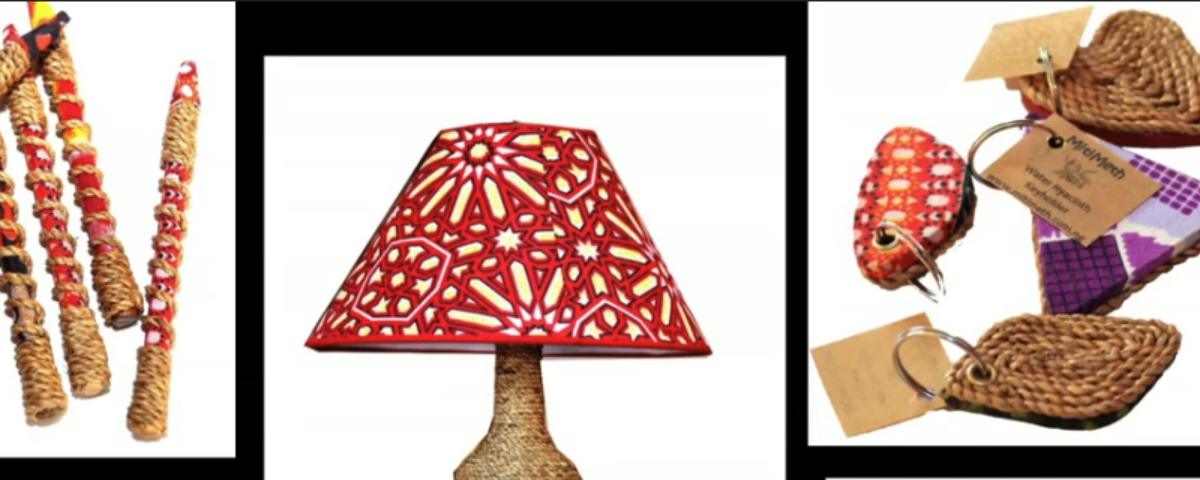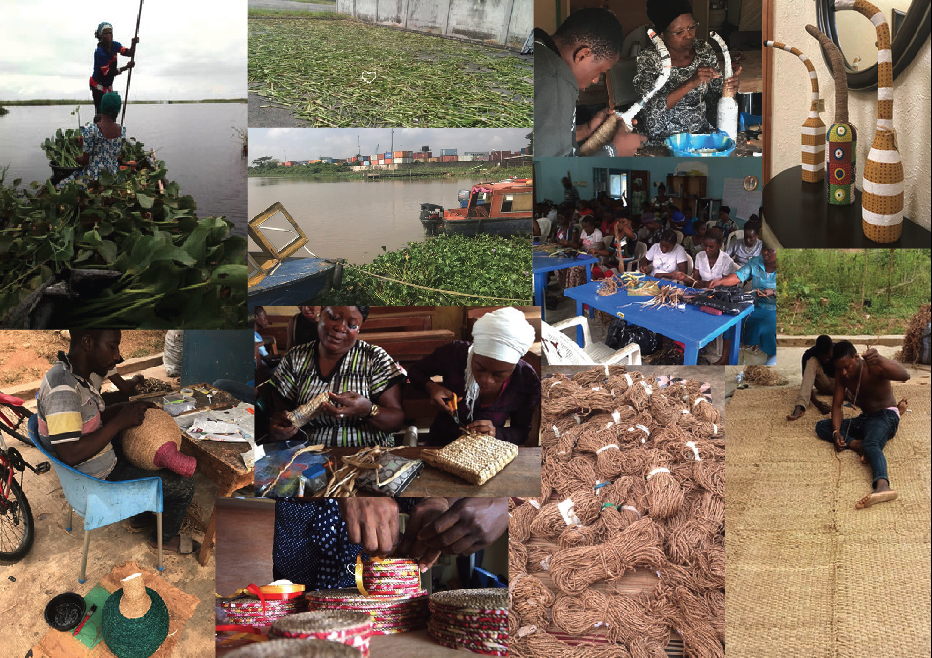





Keep this story going! Share below!
Seeing Water Hyacinth on the surface of the water make it look harmless, beautiful flower plant but to the communities it's an invasive weed that clogs waterways, obstructing trade, interrupting school activities and everyday life. MitiMeth's CEO Achenyo saw this as an opportunity to turn the weed into woven wonders generating economic and green environmental values.
Achenyo Idachaba is a United States-born entrepreneur who relocated to Nigeria because of her strong belief that Nigerian need her more. In her quest on how she can be a figure of positive impact to the country, In 2009 she cited a problem that for years has hinder commercial and social activities in the commercial city (Lagos) of Nigeria Ikorodu area of Lagos State to be precise on the waterway. Fishing and commercial boats locked down by huge seaweed called water hyacinth, which obstructed both the fishing and commercial activities of the community.
Achenyo's belief was that there got to be a better way, in her research she got to know that the plant can be used for handicrafts which led to 3 innovative ways of turning a problem into community development, Decent Work, and Economic Growth while carrying the immediate community along which represent the #11 UN Global Goals for Sustainable Cities and Communities.
The 3 Innovative ways of Turning Water Hyacinth into Home Beautification and Lifestyle;
Achenyo also made us understand that the most challenging part of her 3 steps innovation is the third step the Weaving part. She said she know nothing about handcrafting which led her to the predominant community of the people (Hausa community) that specialize in the weaving trade, where she was introduced to Mallam Yahyah who taught her step by step how to weave.
Working with Mallam Yahyah was the beginning of her partnership in the business. She took the knowledge back to the community to train more people how to weave and Water Hyacinth turns into basket, tablewares, tissue boxes, etc
Achenyo demonstrates Good Partnership for the Goals.
https://www.ted.com/talks/achenyo_idachaba_how_i_turned_a_deadly_plant_into_a_thriving_business#t-2063

Innovation and products of innovation
All of this was inspired by Ms. Achenyo's decision to improve the poor local environment. In Nigeria, many rivers and waterways are overgrown with a pest, known as the most harmful water plant - water hyacinth. This kind of creature is common in low-lying areas or warm coastal areas. It affects the local water quality and water flow and even causes more or less impact on the health of local residents, daily life, transportation, and local economic development by endangering the life of aquatic organisms.
While others' first reaction might be to study how to get rid of the water hyacinth, Ms. Achenyo's idea is unique. She has come up with a very creative concept of sustainable development, which combines innovative ecological solutions to this difficult problem. That is, the weeds are collected, rooted, washed, and hand-woven into the perfect handicraft. Examples are pens, tableware, tissue boxes, wallets, and even some furniture. Different from handicrafts made of other materials, these handicrafts made of weeds will be more tough, durable, even resilient, which is also the unique place and unique story of these handicrafts. Ms. Achenyo has turned these seemingly useless, even environmentally harmful, species into a unique business opportunity through her own creativity.
The emergence of this inspiration is a win-win solution, which not only solves the environmental threat caused by the outbreak of local water hyacinth but also helps her to have such a unique business opportunity. With her own efforts, she directly promotes the economic development of the local community, solves the problem of many local women being unemployed, and realizes the double benefits.
“Waste recovery and utilization, that was essentially my focus”
– Achenyo Idachaba-Obaro.
Mitimeth crafts its products, home furniture, and home essence, from the aquatic weed water hyacinth that would otherwise be considered waste. They have built a business on the act of harvesting waste, adding value to it, and selling it on the market. The only product this business offers is this furniture; therefore, the water hyacinth is an essential part of Mitimeth’s supply chain. The products sold also always have a tag that tells the story of how it was made. Not just that it was handwoven, but that it was made using water hyacinth, which is an invasive aquatic weed, woven by people in communities that are affected by the infestation. People would look at the product, hold it, read the label and think “this is quite interesting” and actually pay money for it.
The business currently employs 150 people: 140 home-based artisans, and 10 full-time workers. We can therefore conclude that this innovation has become a means of people earning income and feeding their children. The business has also trained over 600 artisans from more than 20 communities, essentially giving them life-parting skills that will allow them to “fish for life”. This means the business is heading towards achieving SDG#8, economic development, and decent jobs.
Until today, workers at Mitimeth are harvesting harmful aquatic weeds. This business would not have been sustainable if it was not providing an economic benefit. The harvesting process is all done manually, so for there to be an incentive for people to go into the waters and harvest this plant, there needs to be an economic benefit. The persistence and continuance of the business for years as well as its interest in entering the international marketplace provides solid evidence that the innovation has caused a great impact on the business and the society.
MitiMeth has impacted the lives of the communities where it sources its material by using the local community men and women in the harvesting and production processes, while doing these MitiMeth is gradually contributing to No Poverty in the UN Global Goals for poverty alleviation.
The water hyacinth that Mitimeth creates the furniture out of has been the cause of environmental issues for a long time. Governments have even tried to intervene to help manage the manifestation. The people around these areas in Nigeria rely heavily on the waters for food supply as well as recreation and employment. The extensive-knotted root systems of the weeds tangle together and clog the waterways. They also deplete nutritional resources in their surroundings, leading to a drop in the fish population.
Thus, by pursuing her innovative ideas with the aim of waste recovery and utilization, Achenyo hit a double-entendre. Mitimeth is providing jobs and training opportunities for people in many regions in Nigeria (benefiting the society) and is harvesting a harmful weed from the water (benefiting the environment), which is transformed into a marketable product that is sold for profit (also benefitting the society).
Get stories of positive business innovations from around the world delivered right to your inbox.

MitiMeth creates handcrafted products from natural fibers that would otherwise be considered waste or environmental menaces. These natural fibers include aquatic weeds (water hyacinth, typha grass) and agricultural waste forms (banana bark, maize husks).
MitiMeth upcycles and adds value to recovered waste (plants and non-timber resources) by harvesting and transforming it into furniture and home accents, storage pieces, lamps, kitchen and dining ware, stationery, and branded souvenir items. Everything is made locally but designed with global appeal.
MitiMeth also runs training programs that teach local community members how to find alternative income, the company has so far trained about 600 community members. Currently, MitiMeth has 10 permanent staff and over 150 independent contractors (Artisans).